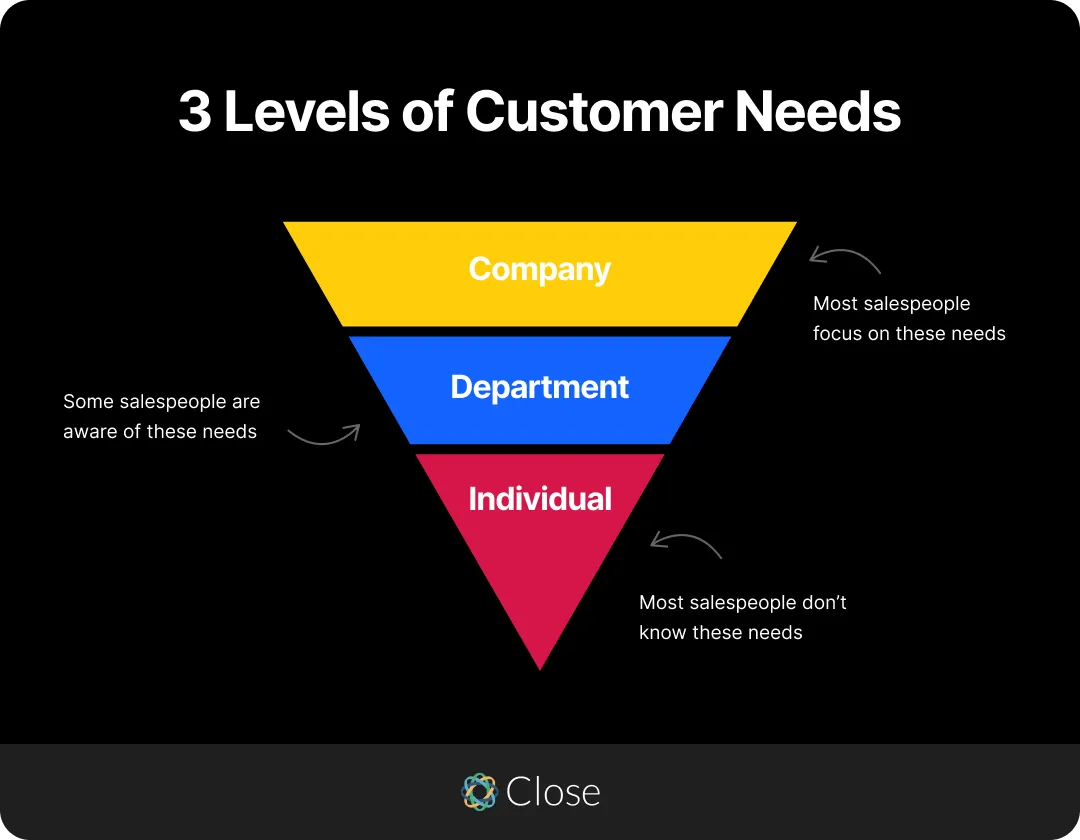
How often do you reach a decision-maker on the first call? Not very often.
Cold calls often connect with executive assistants, office receptionists, or interns. They’re the gatekeepers–the first obstacle between a seller and the close.
The gatekeepers decide if you can pitch your product or service to the right person. This means the fate of your sales calls rests on your conversations with these folks.
Unfortunately, the relationship between gatekeepers and sales reps has always been difficult: They don't have the authority to make a buying decision, but they can prevent you from closing a deal.
In this article, I’ll share six effective strategies to incentivize gatekeepers to connect you to decision-makers a C-level execs. Or, at the very least, provide accurate contact information so you can reach out to the right person.
Psst... Use our objection management template below to build your own responses to gatekeepers and other roadblocks in the sales process.
What is a Gatekeeper?
In sales, gatekeepers are the office managers, personal assistants, or interns who take phone calls for busy decision-makers and assess whether the person calling is worthy of their boss's time.
If the answer is "yes," the gatekeeper will connect you to the decision-maker in question. If the answer is "no," they might tell you the person you’re trying to reach is out for the day or promise to pass on a message that never reaches its target.
To succeed in sales, you must learn how to get past the gatekeeper when cold calling.
Don't Stress About Gatekeepers!
Sales professionals tend to view gatekeepers in a negative light. These people can completely shut down sales before sellers have a chance to make a proper pitch. It can be frustrating when doing sales prospecting to feel like you’re hitting a brick wall.
But I want you to shift your mindset. Instead of viewing gatekeepers as a problem, view them as an opportunity to get your foot in the door. Engage in small talk, and ask questions that might help you better qualify your leads (just don’t be super obvious about it!) Doing so will help you build rapport and earn trust. Once that happens, you'll be well on your way to earning a referral.
Imagine talking to a potential customer, not as the person randomly calling and wanting to move a product, but as a trusted advisor with valuable information to share.
That's way better, right?
6 Effective Strategies For Getting Past the Gatekeepers and Improving Your Close Rates
To make sales, you have to get past gatekeepers. The question is, how?
Don't worry, it's not rocket science. With a little know-how, you’ll breeze by gatekeepers and make more B2B sales, turning you into the star of your inside sales team.
 |
Here are the six strategies you should implement immediately to boost outbound sales. Incorporating these strategies alongside appropriate outbound sales tools can yield significant improvements in your sales outcomes:
1. Do Your Research Before Talking to Gatekeepers
You studied up on your prospect before you called them, right?
Take time to learn about the person you want to sell to. What are their goals? What do they struggle with? What other products and/or services do they already use?
Research the company your prospect works for as well. How big is it? What industry is it in? Does it have the budget to purchase your products or services?
You can find the answer to most of these questions by searching the internet. Sites like LinkedIn are gold mines of information. Company websites and blogs can also be useful.
During your research, investigate the gatekeeper you'll likely talk to and prepare you for your conversation with them. For example, you might learn that the gatekeeper has used one of your competitor's products in the past. They really disliked the experience and it's tainted their view of every product in the category.
This information can help you adjust your sales pitch and talk about your product in a way that won't immediately trigger negative feelings. At the very least, you should know the gatekeeper's name and prepare to talk to them like you would to a decision-maker. Doing so will ensure they don't automatically write you off and prevent you from talking to their boss.
Searching for the ideal sales headset? Our article dissects the top 8 options for cold calling triumph.
2. Provide Value to Gatekeepers to Build a Relationship
Most sales managers will tell you not to sell to gatekeepers. Instead, they'll want you to build rapport with gatekeepers through small talk and charming conversations.
Honestly, that's a load of crap.
Gatekeepers may not make buying decisions, but they’re stakeholders in the sales process. If you try to just sweet-talk them out of the way, you'll probably be seen as another cold caller, AKA the kind of person they're supposed to shield the decision-maker from.
Empathy is such an important skill in sales. You need a hard-nosed attitude that produces results, but you also need a fine-tuned emotional antennae.
As soon as you cold call a company, talk to a gatekeeper, and ask to speak to their boss, the person on the other end of the line will immediately begin weighing pros and cons.
They'll think, "What’s the upside here? Should I interrupt my boss's busy schedule to talk to this person? Will doing so get me a raise? Will it get me fired?"
The first step is to minimize the perceived risk for the gatekeeper.
So, tell them all you need is 10 minutes to discuss a product that could help their business. You’re calling to solve a problem and aren’t asking for much of their time.
Let the gatekeeper know what's at stake if they don't let you speak with a decision-maker—that the competition already recognizes your product's value and they can’t afford to pass on this opportunity.
As you craft your pitch, consider these questions:
- What’s the risk?
- What’s the reward?
- Which problems can you solve?
- What are their individual goals?
- How can you support them in achieving these goals?
Like any multi-stakeholder sales process, you need to figure out how to satisfy the wants and needs of each person involved in this purchase, including the gatekeeper.
3. Build Trust
Build trust by being honest and straightforward, and considering the three levels of customer needs: company, department, and individual.
 |
Trust is much easier to build when you address these needs. For instance, the company can save money, a department can streamline workflows, and an office administrator (the gatekeeper in this example) might get accolades or even a promotion for suggesting your new solution.
Do everything you can to bridge the gap between doubt and trust.
Use testimonials to demonstrate you deliver on your promises. Discuss the other businesses you’ve helped and why you helped them. Share a story about your days as an intern, subtly suggesting you understand the responsibility that comes with their position.
If you can’t establish trust or if they don’t believe you have their best interests at heart, there’s no way they’ll champion your product or service.
Social selling is a powerful form of sales development. While it won't help you get past every gatekeeper, it will help you get past a lot of them–if you’re patient.
4. Manage Gatekeeper Objections
Every successful seller knows how to handle sales objections; it's sales training 101. Guess what? Gatekeepers have objections, too, and they might be a lot different than other decision-makers’ pain points.
Here are a few objections you’ll likely hear:
- I don’t have time for this
- My boss doesn’t want to talk with sales reps
- We’ve tried something like this before, but it didn’t work
- Just send us some information
- It’s not a priority right now
To identify your common objections, ask yourself, "What are the gatekeepers I speak to concerned about?" and "What scares them about sharing their boss's phone number?"
Then create an objection management document so you can craft concise and thoughtful responses to these questions and deal with pushback more effectively. The goal is to talk to their boss–so think about why they don’t want to pass you along, not just why your solution is the perfect fit. Then, you'll be able to manage these objections, even before the gatekeeper asks.
5. Use a Sales Script Specifically For Gatekeepers
You've probably already created a stellar cold call script for decision-makers. Now I want you to create one to get past gatekeepers, too. Here are a few elements your script should have:
Effective phrases in all kinds of conversations with gatekeepers:
- "Maybe you can help me..."
- "I'm wondering who can help me with..."
- "I'm not really sure who the right person..."
- "Could I ask you real quick..."
Asking for help in sales conversations is one of my favorite sales techniques, and it works with gatekeepers, too. Why? Because it shifts the dynamic of the conversation. It makes you more vulnerable, which encourages them to do the same, building trust.
Leverage other people in the company that you've spoken to or know of:
- "I spoke with Michael James in legal, and am now trying to reach someone in operations."
- "I plan to meet with Michael James in legal, and before that, I'd like to talk with someone in operations."
This tactic will encourage most gatekeepers to pass you along to a decision-maker. They'll think, "Well, if he's already connected with someone else in the company, he must be legit."
Take special note of the phrasing in the second sentence: "I plan to meet with...". You could use this even if you've never interacted with the person you reference!
Only use this phrasing if you actually plan to speak with the referenced individual. Don't go around abusing this technique! It's unethical.
Plus, if everything goes well and you do talk to a decision maker, and they get the impression that you've lied to their gatekeeper, they'll immediately lose faith in you.
Reference a project:
- "I'm calling to talk with her about the rebranding project."
- "I'm calling to discuss the improvement of analytics and attribution data."
- "I am calling to talk with her about the current project to improve team productivity."
If you're targeted in your outreach, you may know about a specific project the company is working on. If this project relates to the products and/or services you sell, you can leverage the opening in your initial conversation with the gatekeeper.
Don’t be slimy with this strategy, however. If you just make up a project and expect it to get you past the gatekeeper, you might find yourself ignored by your prospect when they figure it out.
If not, you can resort to more general language like "improve team productivity", "increase customer retention", "boost referrals", "reduce turnover", etc. Just make sure the pain points you reference relate to the company you're speaking to and your offering.
If the gatekeeper still rejects you and says: "We're not interested" you have options:
- "I'm actually not calling to sell anything. I just have a few questions that I hope Michael James could help with, does he have a few minutes?"
- "I understand this doesn't sound interesting to you, and quite frankly, at this point, I'd be surprised if it would. I just called because we helped [mention a similar business to theirs] with [mention what you helped them with, and that you believe to be relevant to them]. Can I send you some information about this, and we take it from there?"
- “How about this: I’ll send you my contact information in case you ever do need anything, and then I’ll get out of your hair. By the way, would you be the best person to email this to or someone else?"
- "How would you feel about me leaving your boss a 30-second voicemail? That way they can quickly listen and decide if it's a good fit.”
Speaking of emails, if you lean more towards being an "email enthusiast," we've got a fantastic article featuring 12 meticulously crafted B2B cold email templates.
6. Be Respectful and Confident
You should always be respectful to gatekeepers. Yes, they're standing between you and a potential sale, but they're just doing their job. Besides, it's not like being rude will increase your chances of success. If anything, it will ensure you never sell to this company, now or in the future.
Respect can help differentiate you from other sales reps. What if the last rep who called was a total jerk? By being nice, you'll quickly elevate yourself in the eyes of gatekeepers.
While respect is incredibly important, it's not the only trait you need to exude. You need to be confident as well. After all, if you're not confident in the products/services you sell, or the reason for your call, the gatekeeper you're talking to definitely won't be either.
I realize this isn't always easy. What if you're new to sales and cold calling prospects gives you the heebie-jeebies? What if it's the end of the month, you haven't reached quota yet, and all you can think about is how nice it would be to close another deal—like, right now?
Do what you can to stay calm and level-headed. It's the only way to improve your success rate.
Successful Sales People ♥ Gatekeepers and Operations Professionals
Don’t treat executive assistants, office administrators, interns, and other gatekeepers like nuisances. (Also, don’t call them gatekeepers in the call.😱)
These people should be viewed as partners in the sale. Once you get them to buy into your vision—after you’ve provided value, built trust, and managed their objections, of course—they’re more likely to pass you along to an actual decision-maker. And they might just put in a good word for you.
Here’s my final suggestion: Be persistent. Follow-up with gatekeepers on a regular basis. Connect with them on social media, and add their contact information to your CRM of choice. This will improve the likelihood of a callback and help you stay organized.
Want to overcome objections like a pro? Download our free Sales Objections Template to build your own response structures:










